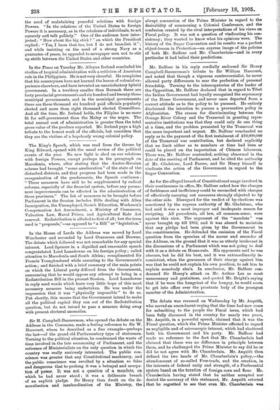Mr. Balfour in his reply cordially endorsed Sir Henry Campbell-Bannerman's
tribute to Sir William Harcourt, and noted that though a vigorous controversialist, he never allowed party differences to mar the perfection of personal friendship. Turning to the interrogatories of the leader of the Opposition, Mr. Balfour declared that in regard to Tibet the Indian Government had loyally recognised the supremacy of the Home Government, and never once departed from a correct attitude as to the policy to be pursued. He entirely disclaimed the intention to pursue a provocative policy in Afghanistan. The reason for discriminating between the Orange River Colony and the Transvaal in granting repre- sentative institutions was that they could only do one thing at a time, and the problem presented by the Transvaal was the more important and urgent. Mr. Balfour vouchsafed no reply as to the payment of the first instalment of 210,000,000 of the Transvaal war contribution, but declared explicitly that no limit either as to numbers or time had been or could be placed on the importation of Chinese labourers. There was, Mr. Balfour contended, nothing abnormal in the date of the meeting of Parliament, and be cited the authority of Mr. Gladstone, Lord Farrer, and Sir Henry himself to vindicate the action of the Government in regard to the Sugar Convention.






































 Previous page
Previous page